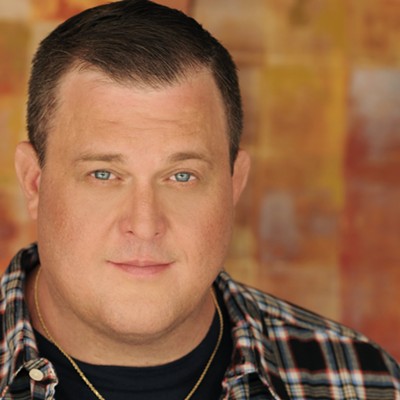Wednesday, June 17, 2009
Unseam'd Shakespeare's Macbeth 3
Cross-gender casting is less controversial (and sometimes more interesting) than cross-racial casting. Pittsburgh's own August Wilson inveighed against the latter, and he had a point: Works like his, set in very specific times and places, are largely about the culture that grew from America's history of racial oppression. They simply wouldn't make sense with white people playing black roles, and vice versa. (The issue's arisen again with an all-black Broadway Death of a Salesman, which some argue can't work for the same reason.)
Unseam'd's stripped-down, three-actor take on the Scottish play, meanwhile, isn't the first time the troupe's gone cross-gender. In fact, the first Unseam'd show I ever saw was a drag version of The Importance of Being Earnest. Not that Wilde's classic needs much help, but having Cecily, Gwendolen and Lady Bracknell (as played by men) tower over the nattering Algernon and Jack (played by women) certainly added a new spin, not least in its critique of traditional "gender-appropriate" behavior as role-playing.
I recalled the technique some years later on reading of a new production of A Doll's House in which the stifled women were all portayed by the tallest actresses they could find, the oppressive men by dwarfish men.
Doing Shakespeare cross-gender, of course, is nothing new. (And originally, all the women's roles were played by men anyway.) Moreover, unlike August Wilson (or Arthur Miller), Shakespeare's plays are little enough about delineating specific social histories that we've long felt free to recast them in any setting we like.
Yet what's interesting about Unseam'd's fine Macbeth 3 (based on an original adaptation by L.A.-based theater-maker Lisa Wolpe) is how not-weird it feels to cast a woman as Macbeth and a man as Lady Macbeth.
If "fair is foul, and foul is fair," after all, why not "girls will be boys and boys will be girls," as another British bard had it? Moreover, as director Michael Hood noted when I interviewed him before the show opened, Shakespeare's dialogue is rife with plays on gender stereotypes.
Take Lady Macbeth's famous Act I monologue: "Come you spirits / That tend on mortal thoughs, unsex me here, / And fill me, from the crown to the toe, top-full / Of direst cruelty! ... Come to my woman's breasts, / And take my milk for gall ..." In proper Elizabethan fashion, she sees remorse and mercy as womanly traits that must be overthrown if regicidal ambition is to be fulfilled.
Likewise, in argument with Lady Macbeth over their scheme, Macbeth's moral qualms are seen as unmanly. "I dare do all that may become a man; Who dares do more is none," he contends. She replies: "When you durst do it, then you were a man; / And to be more than what you were, you would / Be so much more the man."
It's all played "straight," as it were, with strong performances by Lisa Ann Goldsmith as Macbeth; Rich Venezia as Lady Macbeth (and also, rather pointedly, as the added character of Satan); and the seemingly shape-shifting Jennifer Tober in a variety of mostly male roles.
Still, I think what I like most about the Wolpe/Unseam'd meta-commentary is resetting Macbeth not anywhere on earth, or in time, at all. The whole thing takes place in hell, Macbeth forced to relive his violent sorrows endlessly (on a wonderfully creepy set by Gordon Phetteplace, with lighting by Michael Boone and sound by Mark Whitehead).
So when the witches ask, "When shall we three meet again," the answer is, literally, "tomorrow, and tomorrow and tomorrow."
(Macbeth 3 has five more performances through Sat., June 20.)
Tags: Program Notes












